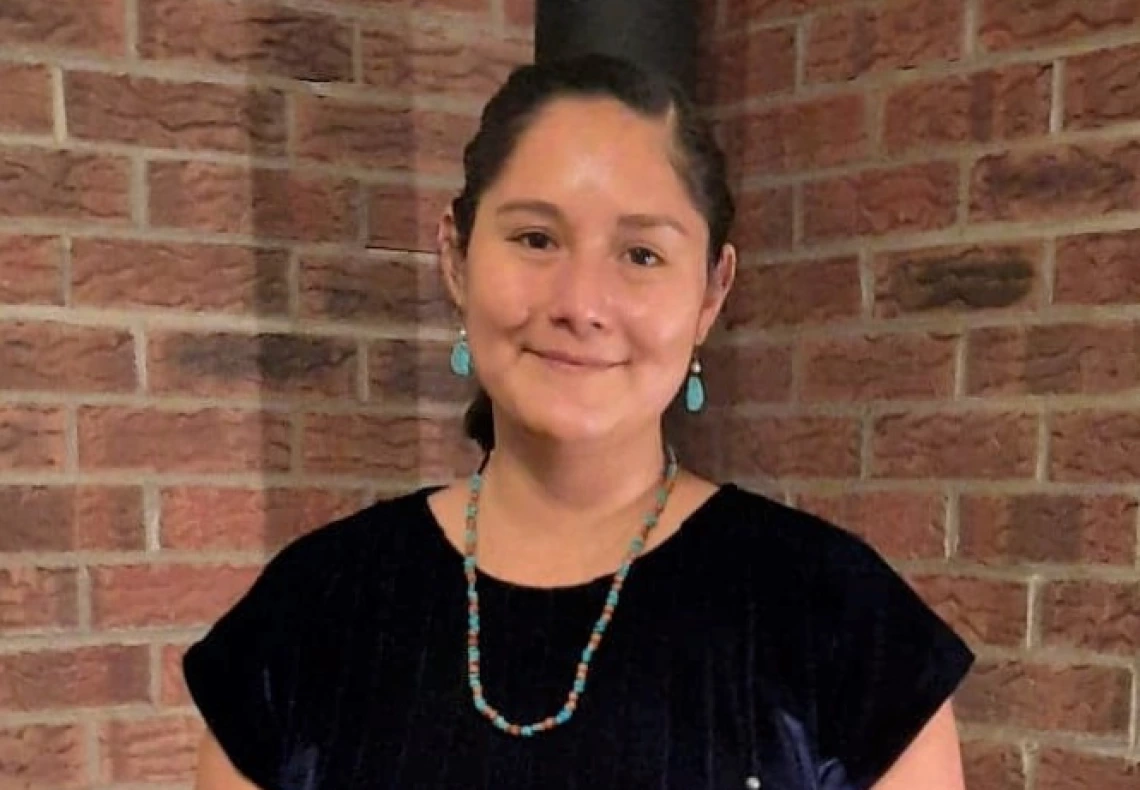Kirena Tsosie, University of New Mexico Water Resources Program.

’Ádóone’é nishłígíí ’éí Tséníjíkiní nishłį. Táchii’nii’éí bá shíchíín. Naakai Dine’é ’éí dashicheii nááná Tł‘ízíłání’éí dashinálí.
The clan I belong to is Cliff Dwellers. Red-Running-into-the-Water is the clan I am born for. My maternal grandfather is Spanish Speaking clan, and my paternal grandfather is Many Goats clan.
Kirena Tsosie grew up alongside the San Juan River, mountains, and alfalfa fields in Upper Fruitland (Doo Alk'aaí), a small chapter located on the very northern corner of the Navajo Reservation 8 miles Southwest of Farmington, New Mexico. The region is known for the ancient Pueblo cultural sites, including Chaco Canyon and other smaller Chaco settlements. Kirena grew up on a farm growing alfalfa for horses and cattle, harvesting wood in the Chuska mountains, harvesting Navajo tea with her grandmother on top of the bluffs, and branding cattle near Huerfano mountain. Her home is not confined to homesite boundaries but encompasses all the Greater Chaco area, where she learned to appreciate all the blessings from Mother Earth and Mother Water. Growing uprooted in the Navajo culture also nurtured her distinct value system -- which honors kinship with non-human entities -- and lead to her interest in science and the human relationship to nature, specifically to water. These values that respect all life on Earth make Kirena extremely passionate about helping Native communities with their current water access challenges and environmental injustices.
 Kirena earned her BS in marine biology from the University of Hawaii at Manoa. Learning about Native Hawaiian culture and people, their cultural understanding of nature, and their relationship with the land and water helped Kirena expand her knowledge of other Indigenous cultures. This reinforced her knowledge of the importance of respecting land, water, and nature for Native peoples. Upon returning to New Mexico, Kirena decided to get a Master's degree in water resources at the University of New Mexico in Albuquerque, where she resides. Her research thesis focuses on a vulnerability assessment of water resources in the Greater Chaco area, New Mexico, in which communities are disproportionately affected by air and water pollution and land degradation caused by oil and gas exploration.
Kirena earned her BS in marine biology from the University of Hawaii at Manoa. Learning about Native Hawaiian culture and people, their cultural understanding of nature, and their relationship with the land and water helped Kirena expand her knowledge of other Indigenous cultures. This reinforced her knowledge of the importance of respecting land, water, and nature for Native peoples. Upon returning to New Mexico, Kirena decided to get a Master's degree in water resources at the University of New Mexico in Albuquerque, where she resides. Her research thesis focuses on a vulnerability assessment of water resources in the Greater Chaco area, New Mexico, in which communities are disproportionately affected by air and water pollution and land degradation caused by oil and gas exploration.
Kirena is also working with the Navajo Nation’s Water Access Coordination Group (WACG). WACG is a major undertaking to create transitional water stations in Navajo Nation to serve families who live off-grid and have significant clean water access challenges. WACG is a team of water experts, Navajo, and federal government representatives, university researchers, and other collaborators, all led by the Navajo Nation and the Indian Health Services. UArizona water and policy experts and the Haury Program work closely with WACG on this important mission. On the WACG team, Kirena has sought to deploy best practices to reach out to community members and inform them -- in English and Navajo -- of the location and operation of clean water access points.
Kirena knows you don’t need a diploma to reach your true potential, but she also believes in the power of education, and she values knowledge that can be drawn from universities and Native communities. She grew up with inspirational role models within her family. Her grandmother Ernestine R. Bates was a passionate Navajo historian and distinguished teacher of Navajo studies. She was the sister of Claudeen Bates Arthur, the first Navajo woman to be licensed as a lawyer in the U.S. and first female Chief Justice of the Supreme Court of the Navajo Nation, and Alberta Bates Tippeconnic who worked diligently to improve the lives of Native people through her work in the Inter-Tribal Council of Arizona on vital environmental, health, jurisdictional, leadership, cultural and historical issues. Kirena has also been inspired by her mother, father, and other role models, including Dr. Lani Tsinnajinnie, Dr. Laura Harjo, Dr. Karletta Chief, and Dr. Crystal Tulley-Cordova.
To all of those interested in working with Navajo people, Kirena recommends looking up Navajo literature and getting to know Navajo leaders. For Kirena, trust is crucial in forging a long-term relationship. As she says, "Trust begins with understanding and valuing community knowledge and valuing community needs instead of having the researchers prioritize their needs and prioritize their knowledge."
Through the Haury Tribal Resilience Initiative, the Haury Program supports the educational pipeline into the workforce for Native American students. The Haury Program joined the SW Research and Information Center to fund a part-time internship at the Navajo Nation Department of Water Resources. The Navajo Department of Water Resources (NDWR) Principal hydrologist Dr. Crystal Tulley-Cordova selected Kirena to assist her in updating the NDWR Water Resource Development Strategy. Kirena has worked with Dr. Tulley-Cordova for about a year. Her collaboration began with Dr. Tulley-Cordova being a committee member for Kirena’s professional project and continues now with Kirena working on tribal water management while learning about water development, water policy, and water settlements.
